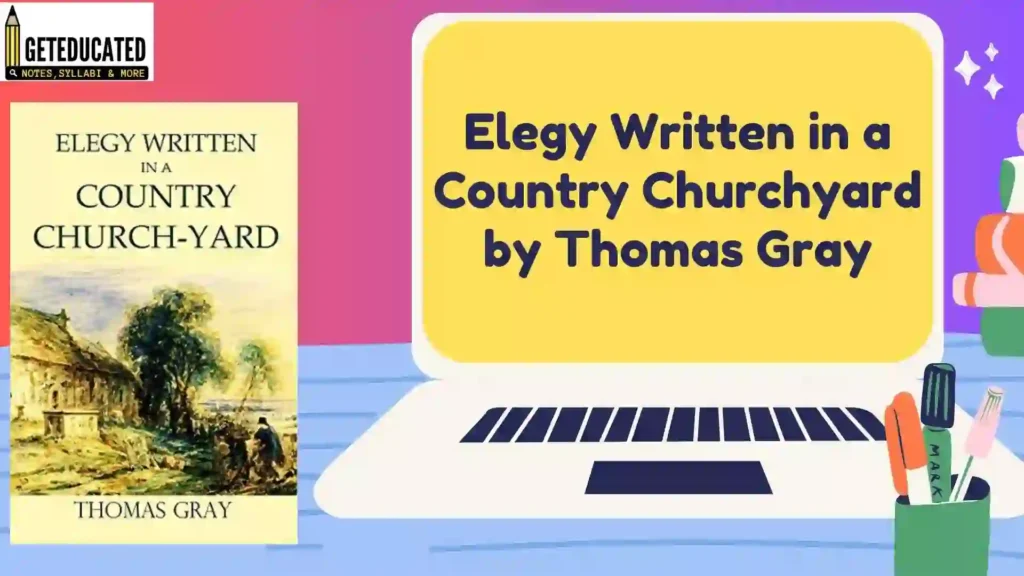
“Elegy Written in a Country Churchyard” is one of Thomas Gray’s most popular poems Structurally, this poem is not an elegy as it is not written in elegiac couplets that involve a hexametric line structure followed by a pentametric line, but thematically, it is an elegy since it is set in a graveyard and expresses sorrow for loss and death. It may have been published on the death of Richard West, a relative of Gray who died in 1742. It is also itself a more general lament about human mortality. It is about meditation on the graves of humble, unheard-of, unnoticed and unknown villagers. Within the field of English literature, this poem is considered a superior example of Graveyard Poetry. Not only does it maintain an elegiac tone for the humble villagers’ death, misfortune, lack of opportunity and deprivation, it also retains an eloquent tone for their innocence, honesty, dignity, modesty, hard work and secret heroism. The poem is edifying us that goodness is greater than greatness. Modesty is more attractive than pomposity. Nobility is mightier than prosperity.
In this Poem, An Elegy Written In Country Churchyard” Poet beautifully compared the parting day with the reality of our life. He appealed the high standard people not to give disdainful smile at the rough lives of the poor or their forefathers. He revealed the truth of life that everything in this universe is mortal and temporary. Every single person will have to leave this world with an empty hand and the destination of our life is the grave. This Elegy is unique in more ways than one. Primarily, the 18th century audiences were passing through a society which was full of city bred, fashionable and pompous beaus and belles. It is through this elegy; Gray had extended his sympathetic flavor from a famous personae in the Augustan city centre to a ‘rude forefather’ of a small ‘hamlet’. Which is why Gray remains the preeminent precursor of Romanticism, an age tempered by democratic sentiment and remembered for rural affiliation. It is in the Elegy we can concur Lyle Glazier’s belief that ‘Each rude forefather of the hamlet has become a type of mankind. There is thus a double Everyman in the poem – the poet observer, who is Everyman still alive and reflecting about death, and each rude forefather, who is Everyman already dead and underground.’
The Elegy starts in the hovering stillness of a dying day. The melancholy-stricken elegist muses over the life and living of the poor and tries to recover their wispy traces of history from the grave of time. Nature remains as the befitting background in the opening section of the poem. Within stanzas 1 to 3, the elegist sets the tone, atmosphere and the back ground of the elegy. As Graham Hough observes, “Gray is here far less concerned with nature as an object of contemplation than with the readers- the readers whom he wishes to lull into a resigned, acquiescent, summer-evening frame of mind. True to the spirit of a Graveyard poet, Gray finds the graveyards of the Stoke Poges Church vicinity (where he himself is now buried) as the congenial locale to reflect on the transience of life. So, the poet begins to muse ‘upon the conditions of rural life, human potential, and mortality.’
Also Read :
Critical Appreciation of “Elegy“.
Stanzas 14 – 19 describe the fate of the poet himself or of the speaker. The person addressed to in these stanzas may be an imaginary person or an actual poet with whom Gray may have been acquainted during his stay at Stoke Poges or Gray himself. He relates the ‘artless tale’ about the ‘unhonoured dead’ in this poem. Someday some wayfarer may come, and enquire about his fate. Then some old peasant will tell this wayfarer (some kindered spirit) that he had usually seen the poet at dawn rushing towards the upland so as to reach there before sunrise. There beneath the beech, he would lie down and keep looking at the murmuring stream. He would wander there muttering crazily as if he were alone and full of anxieties or had felt frustration in love. The old peasant would further tell they wayfarer that one day he did not find the poet on his favourite spot. Nor was he there the next day. The following day his body was seen being carried away towards the churchyard where he was burried. The peasant would ask the wayfarer to approach the poet’s grave and read the epitaph engraved on it.
Thus death seems to have overpowered the poet whom was writing about the death of the rustic forefathers of the village and pointing out their desire to be remembered after death. The similar desire of the poet is fulfilled by the engraving of the Epitaph on the grave. In these stanzas preceeding the Epitaph, Lyly Glazier finds “a note of mawkish self-pity, which lends weight to the belief that Gray wrote this poem in a fit of self commiseration to find consolation for the world’s neglect.”
Aristotle, the ideal student of the ideal teacher of an ideal republic once remarked that ‘Poverty is the parent of revolution and crime’. Gray has shown, in much contrary to the aforesaid philosopher’s dictum, that in spite of having tolerated deprivations of many kinds, the poor never revolted against the establish system nor do they take recourse to the short-cut crimes that poverty usually breeds. As for his Classicism, Gray has the same classical concern with perfection of form as Pope had. The line ‘The Ploughman homeward plods his weary way’ is said to have caused Gray hours of trouble. How should it be written? ‘The Ploughman homeward…’ or ‘The homeward ploughman …’ or ‘Homeward the ploughman…’ or ‘The weary ploughman…’ or ‘Weary, the ploughman…’ Gray did, infact, as said by Anthony Burgess in English Literature (1987) “expend great trouble on the polishing off his verse, and the Elegy’s easy flow is the result of hard work more than inspiration.” In every stanza we meet lines that have passed the test of time and became part of the English language’s reservoir, sounding almost Shakespearian in their familiarity, Spenserian in its mellifluousness. But Gray had nothing of the swiftness and fluency of the great Elizabethan. Every effect was worked for, and Gray deserves his success.
In course of pleading the case for the poor very much like a jury, Gray has elegized the theme by categorically using ‘death’, ‘chill penury’ and ‘lot’ by personifying each of them. Gray has shown ‘death’ as a great leveler for all – the have nots and the have lots, ‘chill penury’ as a repressor and the ‘lot’ (luck) as circumscriber of the poor’s progress. Readers are affirmed that had they not been poor, they even could have become either a poet (‘celestial fire’), a potent king (‘rod of empire’) or a gifted musician (‘living lyre’). By using the quantifier ‘some’ before the proper nouns- Hampden, Milton, Cromwell Gray has only extended the potentials of the poor to become famous.
You may also Like :
“Short and Simple Annals of the Poor” – Elegy
Rarest gems often lie submerged and hidden in the deepest caves of the ocean as also the sweetest flowers bloom and die unseen in deserts, without there being any admirers of their beauty.In the same way perhaps this village might have had its own rebellious Hampden like figure who might have defied some despotic local landlord. Among these graves might lie buried, some unrecognised poetic talent like that of Milton, or a Cromwell-like leader of the people but who, (because of his restricted actions and chances) did not have the guilt of bloodshed (caused during the political turmoil of the Civil War) on his conscience. Their limited fortunes prevented the obscure villagers from attaining high positions while overcoming barriers in their way. Thus, they did not earn applause in Parliament, nor did they perform historic deeds to bring prosperity to their nation. However, their limited chances also prevented them from committing the kind of crimes that public life often entails. Their obscure destiny prevented them from becoming dishonest and shameless in the pursuit of power. Nor as poets or writers did they have to work their way upwards on the ladder of success by worshipping their patrons with false flattery. These rustics therefore lived, distanced from the life of dishonourable competition that causes city folk to strive madly after lofty goals. In contrast to the embattled state of the world of public affairs, the villagers’ calm-paced and retired existence always continued on its even and straightforward path.
Stanza 14 invests the objects, gem and flower, and their natural habitat with metaphorical force thereby imaginatively recreating this village in the images of the unplumbed ocean or an un-traversable desert. The implication is that the obscure village is equally remote, as are the ocean beds and deserts from the world of action and public rewards and honours. Gray alludes to Pope’s lines of verse where Belinda in The Rape of the Lock (IV.153-54: 157-58) wishes she had ‘un-admir’d remain’d’ /In some lone Isle’ and There kept my Charms conceal’d from mortal Eye/Like Roses that in Desarts bloom and die’. There is also an allusion to Milton’s Comus (732-33) in ‘The unsought diamonds/Would so emblaze the foreheads of the deep’. ‘Purest ray serene’ is a typical Miltonic placement of adjectives, one before and the other after the noun.
In stanza 15, historical human figures, village-Hampden, ‘mute inglorious Milton’, ‘Cromwell guiltless’ are similarly metaphors representing those talented rustics who simply never had the same chances as those celebrated public creators of history. John Hampden (1594-1643), English patriot, cousin of Oliver Cromwell, had resisted Charles I by refusing to pay a tax imposed without Parliament’s approval; John Milton (1608-74), poet and author of Paradise Lost, republican and like Hampden, had been a champion of liberty; Oliver Cromwell (1599-1658), served as Lord Protector of England in the years 1653-58, following his Puritan revolt that led to the execution of Charles I. All the phrases of stanza 16, that describe public actions that might have been performed by the rustics had they not been obscured, depend on the main clause “Their lot forbade’ in line 65, stanza 17. They also could not read their personal actions as commemorated and reflected in the public history; could not read their history in a nation’s eyes’. Thus, they did not figure in the cultural memory of the nation. This idea connects with Gray’s concern with the need for adequate memorials for the dead.
The following part of the poet’s argument offers him a consoling thought that their hidden rural existence, ‘far from the madding crowd’s…strife’ also prevented ignoble actions, and contained their potential for evil as much as of virtuous and glorious deeds.
To conclude, we can say that, there is left almost no literary master who does not leave a comment in Gray’s elegy. Few were hostile and few favourable. It only testifies that Elegy has always been included in the personal canon of any reader of British literature. The most popular among the opinions is the critical hostility from Johnson, who charged Gray of Whiggism and depreciated Gray’s adjectival coinage of the word “honied” from its noun “honey”(both Shakespeare and Milton used it, though).Readers frequently quotes Johnson’s ultimate appreciation of the Elegy which he ‘rejoiced to concur with the common reader’ In his love for the old and his adventures into the new, he anticipates an age that was to develop both his romantic instincts and his classical restraint.”(434).As for the permanence as a piece of art, David Kennedy rightly observes, ‘The elegy remains the urn that is never finally completed but is perpetually being ‘storied’ in front of audience.’

[…] Gray’s Comment on the Unlettered Village Poet – Elegy […]